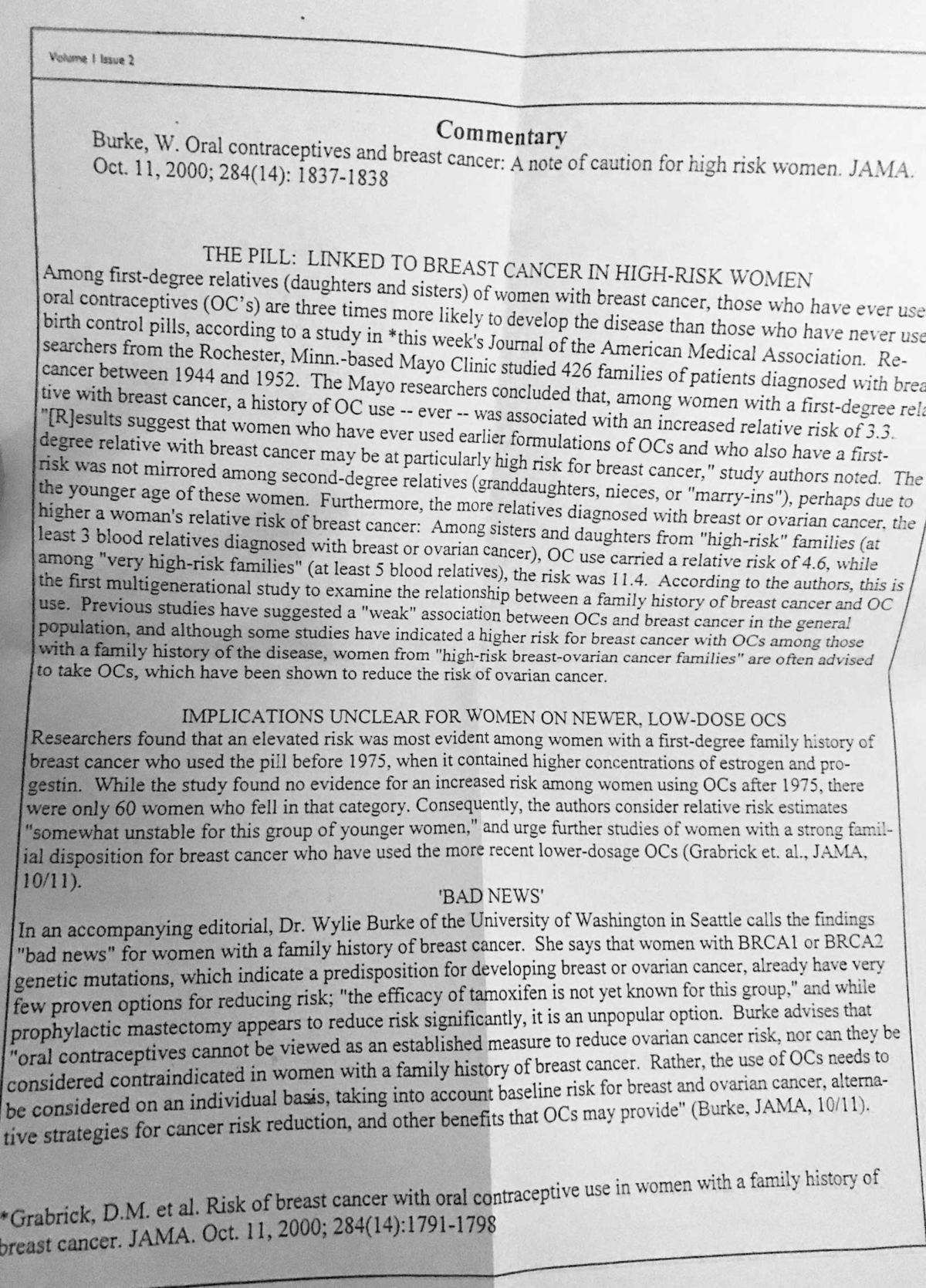Sprawled on the couch, legs above my head on the back of the sofa squishing the pillows under my limbs, heavy, I am staring at a box across the room. It looks like any other box aside from its color—a deep blue, it still holds the markings of the wine it held in another life. That goddamn box is like a rock in my shoe, no matter how many times I stop to toss it aside, at the end of the day, it is still there, nagging. The Box has been across the country with me (twice) and, after spending 10 years in a closet, is my most recent souvenir from a trip home.
I no longer had the excuse of school (although my loans would say otherwise) and I had a job that allowed me to afford a place of my own and, in it, a place to store things. This job, aside from the additional storage space, was the reason I finally unearthed The Box. WomanLab elevates the lives of all women by spreading truths about sex; I saw the real effects of cancer on my mother’s self-image and the way in which she negotiated her femininity and selfhood as her body morphed through years of chemo and radiation. It was inauthentic to be a member of WomanLab, a platform of proud-vulnerability, when I had this relic shoved away in some dark corner.
Just do it. Just open the box. This demand (pep talk?) goes on incessantly inside my head, fueled by the little girl still deep-seeded inside of me. Get up. Open it. I don’t even bother to grab scissors, feigning intentionality as I rip the tape away from the top. The box rips, tape is thrown, and finally, the contents are exposed to the world. I just stare—I’m all at once numb and curious as I hold the flaps back to examine the guts, The Box suddenly transformed.
Anyone else would see a mess of paperwork, a couple manila envelopes, a few more binders, and cards. So many cards. There is no free space in this box, only because the carefully handwritten notes have filled in the spaces like sand, packed in, suffocating the contents between their Hallmark cardstock.
These notes—from friends, from daughters’-classmates’-parents-turned-friends, from fellow weary cancer travelers—these surfaced as relics from 2000-2001, the year my mom lived in California to try an alternative treatment for her aggressive, metastatic cancer… acupuncture.
I take a breath in and grab one. Breathing out, I notice the postcard, dated October 2000, is a print of Georgia O’Keefe’s Light Iris. On the back: I talked to Mark, he said you’re doing well and seem to be responding well the treatment. Those walks on the beach… wow.
I grab another, like I can’t get enough, this time a card with “MISSING YOU” printed loudly on the front: Thought I would send this article I got at the doctor, I wasn’t sure if you had heard? They think birth control may have something to do with breast cancer. Will you talk to Dr. Ha about it?
Voraciously consuming the notes as if my mom was going to walk around the corner and catch me reading her personal affects, I soon moved on to the manila envelopes. Hundreds of pages—medical records, blood levels, newspaper clippings. It was like an episode of Law and Order. JAMA manuscripts, the latest from NIH, the list goes on. I can’t help but wonder what my mom would have thought of WomanLab—this platform that talks frankly about sex and womanhood, topics I saw my mother grapple with every time the cancer came back and she had to shave her head… again.
In almost 20 years, I know resources are more accessible with the penetration of the internet into our everyday. The convenience is accompanied by vulnerability—do you really want to know everything? Who is telling you this information? So much has remained the same, too. The latest research may not be printed and sent in a card but is certainly bookmarked on Google Chrome. Notes from family and friends still bolster pieces of our soul that text messages can’t. This project comes at a time when information is plentiful, accessibility is unquestioned, but patrons looking to consume the information often have to armor-up before diving in.
I see WomanLab as an old-wine-box-turned-keeper. Selflessly holding correspondence between trusted friends on the latest treatment recommendations, research on the most-up-to-date medical advances, and custodian of needed humor and stories. It is that handwritten note with the latest research cut out and lovingly put inside.
It’s been about a month and I’m halfway through that box. The last note I read was from a 7th grader, stressed about her Humanities test on Friday and looking forward to the weekend. She ended it with:
I’m going to the library this weekend to learn more about acupuncture. Just make sure you don’t move when they’re doing the treatment because you can bruise. Wish me luck on Mr. Boswell’s test.
I love you, 14 more nights until I see you,
Meg
WomanLab is for women and those who love us—even the precocious, 13-year-old daughters, like me.

Edited by Leilani Douglas
Updated September 3, 2025 by Delaney Romanchick